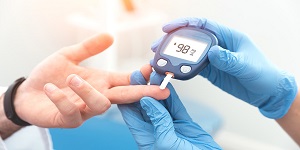
diabetes-cancer-management-2021

Theme: Expanding the Possibilities to Fight against Diabetic Cancer
We welcome all the dynamic scholars from all over globe to attend the “Webinar on Diabetes Cancer Management” scheduled on October 8, 2021. This Diabetes Cancer Management webinar will be organized around the theme “Expanding the Possibilities to Fight against Diabetic Cancer”. This webinar is the best opportunity for those who have centered their focus on the Diabetic Cancer Management and want to share it with the rest of the world. Presentations, distribution of information, meetings with current and potential scientists, discussions on new developments and research and receiving recognition at this event are the main motive of this webinar.
Renowned speakers all over the globe are welcomed to talk about their researches, developments and also discuss the latest updates and new techniques for the treatment and surgery involved in Oncology.
Session 1: Diabetes
Diabetes will focus on metabolic disorder having multiple aetiology. In case of Diabetes mellitus there are high blood sugar levels over a prolonged period of time and is characterized by chronic hyperglycaemia resulting from either insulin secretion, insulin action, or both. The effects of diabetes mellitus with disturbances of carbohydrate, fat and protein metabolism include long-term damage, dysfunction and failure of various organs .When it became most severe, ketoacidosis or a non-ketotic hyperosmolar state may develop and lead to hypnosis, coma and in the absence of adequate treatment, death will occur.
Session 2: Cancer
Cancer is a group of diseases involving abnormal cell growth with the potential to invade or spread to other parts of the body. These contrast with benign tumours, which do not spread. Possible signs and symptoms include a lump, abnormal bleeding, prolonged cough, unexplained weight loss, and a change in bowel movements. While these symptoms may indicate cancer, they can also have other causes. Over 100 types of cancers affect humans.
Session 3: The effect of cancer therapies on diabetes
Many cancer chemotherapeutic regimes include glucocorticoids which may induce diabetes or exacerbate pre-existing diabetes. Other therapies, such as androgen-deprivation therapy (ADT) with luteinizing hormone-releasing hormone agonists for prostate cancer, are linked with increased risk of the development of type two diabetes, possibly due to loss of insulin sensitivity. Use of ADT in patients with pre-existing type 2 diabetes and prostate cancer leads to worsening glycaemic control over 2 years, along with increased insulin requirements.
Chemo radiation may also induce hyperglycaemia. Platinum-based chemotherapy (e.g. cisplatin), 5-fluorouracil based chemotherapy, mTOR (mammalian target of rapamycin) kinase inhibitors (e.g. everolimus) and ABL (Abelson murine leukaemia) kinase inhibitors (e.g. nilotinib) have all been associated with hyperglycaemia.
Session 4: Glucose control matter in people with diabetes and cancer
Observational studies suggest that the coexistence of diabetes increases mortality amongst patients with cancer, with a 30–50% increased all-cause mortality for a variety of cancers. Pre-operative diagnosis of diabetes increases the risk of post-operative mortality for some cancers. In a meta-analysis, pre-existing diabetes was associated with increased risk of postoperative mortality across all cancer types, compared with non-diabetic patients undergoing operative cancer management. In vitro studies also show that hyperglycaemia reduces the efficacy of chemotherapy on breast cancer cells.
Session 5: Practical management of hyperglycaemia in patients with cancer
Managing pre-existing or newly diagnosed diabetes in patients with cancer can be challenging. Many patients undergoing treatment may be struggling with multiple co-morbidities and the adverse effects of their cancer therapy. Nevertheless, pragmatic management of hyperglycaemia appears to be important to reduce hyperglycaemia-related symptoms and perhaps to improve morbidity and mortality from cancer therapy.
Session 6: Cancer Chemotherapies
Patients with long-standing diabetes may have cardiovascular co-morbidities, renal or neuropathic disease which makes chemotherapy challenging. Many chemotherapeutic agents may exacerbate renal dysfunction or worsen neuropathic complications. Patients with diabetic co-morbidities should be carefully counselled about the risk and benefits of such agents. Avoidance of dehydration leading to acute kidney injury should be a clear priority in such patients.
Session 7: Glucocorticoid induced hyperglycaemia
Glucocorticoids may be used in anti-emetics regimes, to reduce oedema, aid with nutrition or to help in pain management in patients with cancer. Haematological malignancies respond well to high dose glucocorticoids and these drugs are integral to the management of such malignancies. Glucocorticoids raise plasma glucose by increasing hepatic gluconeogenesis, increasing insulin resistance and reducing insulin secretion. Glucocorticoids are frequently administered in a high, once-daily dose. Splitting the dose into multiple smaller doses or administering the drug intravenously over a longer period may slightly mitigate the hyperglycaemic effects of glucocorticoids.
Managing glucose in patients with diabetes and cancer can pose a significant clinical challenge. As there is no clear evidence that tight glucose control improves outcomes in cancer, hyperglycaemia should be managed pragmatically, to ensure the patient is kept asymptomatic and at low risk of acute decompensation. Proactive management of glucocorticoid-induced hyperglycaemia may help reduce large fluctuations in glucose levels. An individualized management plan may help the patient manage their intermittent periods of cancer therapy proactively, so that they are able to anticipate glucose rises and respond to them quickly. Patients with type 1 diabetes or those requiring periods of enteral feeding will need careful liaison with the diabetes specialist team. Planning diabetes care at the end of life will need involvement of the patient and their family in setting realistic goals and avoiding distress in such circumstances.
- Diabetes
- Cancer
- The effect of cancer therapies on diabetes
- Glucose control matter in people with diabetes and cancer
- Practical management of hyperglycaemia in patients with cancer
- Cancer Chemotherapies
- Glucocorticoid induced hyperglycaemia
- Chemotherapy: Open Access
- Endocrinology & Diabetes Research
- Journal of Clinical & Experimental Oncology

















































































































